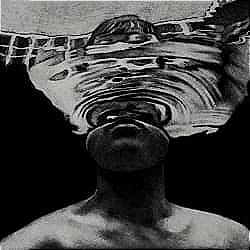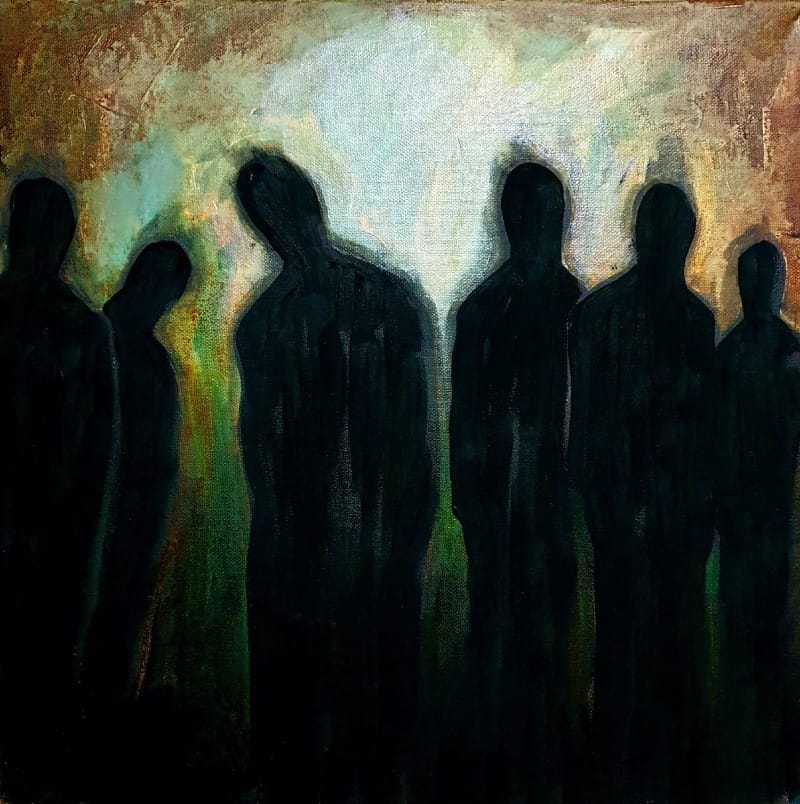Begin,
First let me define what I mean by Immaturity.
Immaturity as the conscious action of accepting all conscious contents—thoughts, feelings, pain thresholds, and comfort barriers—as immovable, yet distinguishable from one's experience of identity.
Are we born balanced, and does interaction with the world simply remove this giant mast on our ship?
This mast is the thing that everything conscious and unnatural passes through, with or without conscious awareness. How can it be that we have lost something we may have never owned?
AWARENESS AND CONSEQUENTIAL KARMIC ACTION
From birth, one is cast into a fragile world designed by other creatures, and in their living room, the whole world spins in the same way for every pair of eyes that can see it. The formulation of identity rests on the belief that temporary and consequential conscious durations of time in experience are both unique and private to one's own mind. (Consequential as logical karmic developments of consciousness: i.e., I place my hand on the table, I begin to feel the table, I think from hereon other thoughts and sink into the awareness of the table in my conscious field.)
Consequential Karmic Action
Following this thread of thought, the consequential contents are not entirely unique to the individual; they are universally shared. The only difference in the information one secures within that moment lies in the indifference in biological systems and psyche wiring. People have systematic errors within them: mental disorders, traumatic malfunctions, brain damage, stupidity—all of these contribute to the process of obtaining and passing information through consciousness.
This is factual. What is also factual in this regard is that if we slowed down time and watched ten people perform the same action—say, picking up a glass of water and pouring it into a cup—everyone would look identical. The steps I outlined are the consequential conscious contents of eternal life. In this moment, if we had each participant dress in a costume that leaves no trace of their figures, covering their heads with a hat, it would be impossible to notice who is pouring the glass. If height and size were eradicated, there would be no way of identifying anybody. In this moment, their identities are one. There is no uniqueness to their selves. The self observed has become like water, indistinguishable from the rest of the participants. The so-called individual appears to be the same as everyone else. It is body movements and language.
Therefore, what we apply identity to is not entirely what we can see.
I am demonstrating through hypothetical situations that are not entirely perceivable at first glance. But the self-conscious individual lives in a warped time world. His movements can become both too quick and too slow, and he projects this onto the motion and movement of others he encounters. Self-consciousness is a tool that allows you to witness the conscious speed of yourself and, in essence, infiltrate the body’s first intervals of awareness. Self-consciousness has taught me a great deal of pain and given me a large library of esoteric body language.
The thing we know to be our self, by law of perception, is something that we cannot see. The pointers we make about our appearance are secondary to this understanding. They are not considered important by the psyche; they are only considered through our psychosocial demands. This is where we find social chaos and inner collective complexes that wire us into the lower grounds of our conscious lives.
The deviation from this is that we are often told to let go, and by letting go, we allow the contents of the mind to develop across the landscape fruitfully. The issue with this, in contrast, is that the individual then becomes something led by the faculties of the mind spontaneously. Though it is not possible to be in total submission to the mind’s drive entirely—and even among those who have handed themselves over to the psyche’s prowess—they are still fated with the same universal reality of having this consequential conscious awareness manifest.
The rules of awareness are limitless. For the sake of this point on the entirety of the self-manifesting, awareness does not only apply to the body experience; it reaches out across time and among the material world. One can be aware of a table that they rest on just like the wrestler is aware of the opponent's body he is grappling with. In these moments, the same abilities have been applied because his awareness extends beyond his body and becomes one with the material world. One, in this instance, can considerably say, "The table is I."
The focus here is that this process of awareness is overlooked as something not equally valuable as our goals and dreams. Our values and attention are placed forward instead of presently within this awareness. It is entirely possible that awareness itself is a tool with supreme capabilities and a tool for increased limitation. Duality. But in regard to the topic of the self and identity, it is vital to point out that universally every living person who has a normal functioning body and brain has the same identical experience when doing casual things, and therefore, we are not unique or different from one another within this particular domain.
Having surpassed this issue, let us look at the voice.
On The Voice
The voice is a particular function that everyone has access to, disregarding those who are deaf and those who suffer from any birth conditions that prevent speech from happening. The human language is utilized and acquired by everyone in every culture and country across the world. It is by no means unique. Language is like a library of summarization games that we can inhabit and utilize to express a single point of memory and present engagement. After all, everything is a memory as time moves by the second, so what we once said five seconds ago can be used within the next few moments if needed, and therefore, what we say in the present immediately enters into the past.
For those who are more academic and have a wider vocabulary with more polished deliverance, human language still remains the same medium as it does to the person who perhaps has a less than 100 IQ. The reason for this is that experience encapsulates many conscious contents to the beholder, and it can be translated in many different ways. I wouldn't say infinite ways because we orientate our speech and direction of communication toward ideals and values—in essence, the undertones of absolute truth. However, these ideals and values are universally held.
Nationalism, religion, morality, and self-preservation modes of models exist factually. Their identity may be difficult to conceptualize in philosophical and even scientific terms, but they are real physical occurrences. Yet, you can explain the most complicated topics to the most stupid people if you follow one rule: simplify and adjust it to their capacity for knowledge. However, you cannot give them the insight and the reward of perceiving something in depth. You can translate, and maybe they may gain a spark of inspiration and psychic power, but they will not be able to continue down its pathway of deeper insight.
In this regard, the voice is what will take us to the heights and lows, depending on how our internal orientation is mapped. This is due to the power that comes from human interaction. Human interaction summarizes and justifies that you are really alive on this earth, and there is another version of you that is also here at the same time, and you both understand a few things about certain fragments of this environment. Symbolically, how can this not make sense to the non-believer? That, in essence, is a formula for the manifestation of psychic power. Human interaction elevates the experience of the self; it tailors its engine to be engaged with the grounded world, for it is hungry for the workings of the world.
It is known that the voice contributes to the process of distinguishing people from people, and there are obvious unique characteristics to the display of a voice. We are never bewildered by someone's voice for more than one hour; we adapt and get used to it. The voice, in this instance, is a part of the human being. It is the totality of the inner body experience. One can hear in someone's voice the inner life of the speaker but cannot see this inner life. One must either follow in submission to the sound and allow the melodies of their speech patterns to direct and deliver the information they are sharing while speaking to the person.
Supposing that the person speaking is delivering themselves with authenticity, then all works. But this is universal; there is no difference again with our voices. They sound the same, but we cannot talk without using the voice. The voice is a tool we all inhabit and use. In this regard, the only distinction that can be made is that neither is the voice where the self resides, but rather it is a tool through which this ghostly self passes. Then again, the voice allows us to recognize who is who, and it generates the library that we keep, making it wider and more prolific as we traverse time.
So far, we have touched upon two universal tools that everyone who is alive in the world and in moderately good health has and utilizes. These two tools are absolutely necessary to life, and every human being born has these at their disposal. They are indestructible; the only thing that may destroy them is paralysis and catatonia. The concept of the self as a higher ideal encounters these tools, and no god or conscious animal can exist without them. This is why they are worth investigating as elements that make up our consciousness.
On Facial Expressions
Suppose we wish to be in complete dialogue with our "true self." In that case, this true self must manifest through our facial expressions. But how are we to know that our true, authentic self has been manifested through our facial expressions?
Considering all the prior discussions, let us assume that we consider this self to be one that can span across time. It is therefore a future self, a present self, and a past self—the trinity of our soul. This future self has its own set of identifications, a set of characteristics that appear to be different from our current set. The interesting point with this is that experience is timeless; it exists within the paradigms of the past, present, and future simultaneously. To hold a flag in one location and say, "This is the self I have found," is ludicrous.
There was once a time in the past when you believed you had found yourself, everything had aligned, and you had mastered something. Ahead in the future, you find yourself at odds with existence itself; everything within you is unbalanced, and you are chaotically lost. Then, among the present, you find yourself driven to peace because the burden of the past and the present are neither here to invade, nor conceptually are you aware of their presence.
The appearance of the self has to be fluid, like water. It must transfer itself across and through every situation that can be experienced in reality. It can endure torture, mountain ranges, and underground tunnels. It passes through every event that exists. It does not disappear under the most strenuous of experiences because what you lose in the face of terror you will grow into another life. Somewhere in the distant future, you will look back and know that it was no use to you anyway. Therefore, the self is eternal in that nothing can eliminate it besides the mystery of death. The body is the vehicle for the self; without it, the body becomes reduced to fatigue and illness. It is clear that one can have the self ever present and then lose some threads to it through some type of intervention. It most definitely has angles and roots in the symbolic interplay between our story narratives and the instincts that occupy through the systems in the body, for our souls are safe even in the most violent of stories.
The presence of this self we seek is rather transferable within narrative access. The stories we ignite through socializing and the inner dialogues are not entirely the service or responsibility of the self. In this manner, the self is subordinate to everything that happens within our social lives, and this very self is disdainful towards the very essence of our social lives, offering casual distractions and embarrassments that we simply have to take responsibility for despite being unaware.
This mysterious force that passes through and utilizes our bodies moves through each fiber of every limb. It is not wrong to suggest that the body is responsible for certain social injustices rather than the individual spirit that inhabits this home. This terrain proves that we have no choice but are forced to take responsibility for the suffering that we accidentally conjure onto the world.
It is the depth that extends the self. If you gaze at the wall for long periods, life becomes more intense. If you speak your feelings in complete relaxation, ignoring another's presence and delivering it, life becomes more intense. This "intensity" is the vitality of existence—cosmic channels of vibration, moon, stars, sun, planetary existence, symbolism transference.
The rules of awareness are limitless. For the sake of this point on the self-manifesting, awareness does not only apply to the body experience. It reaches out across time and among the material world. One can be aware of a table that they rest on, just like the wrestler is aware of the opponent's body he is grappling with. In these moments, the same abilities have been applied.




